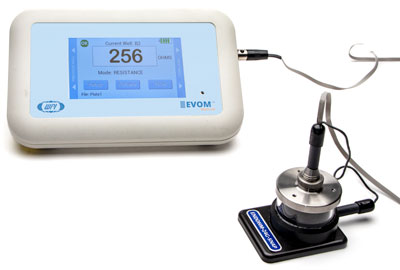
.png)
EVM-EL-03-01-03
ENDOHM-24 EVOM™ Electrode for TEER in 24 mm Insert, for use with EVOM Manual and EVOM3
- Overview
- Specifications
- Accessories
- Citations
- Related Products
Overview


1.png)
There are 3 images available to view - click to enlarge and scroll through the product gallery.
EndOhm Instruction Manual
/ Download as PDF
EndOhm Data Sheet
/ Download as PDF
For TEER measurement of epithelial and endothelial cell cultures in individual cups
- Compatible with legacy meters including EVOM3 and EVOM Manual™ meters (see options section for compatible with legacy models including the EVOM2 and Millipore Millicell ERS2 meters)
Benefits & Features
- Stability and reproducibility superior to the STX4 electrodes to 1% tolerance
- Symmetrical electrode pattern disperses test current uniformly
- Tri-leg supports offer mechanical stability and the membrane is held parallel to the electrodes
- Simple test procedure to verify electrode performance
- Adjustable apical electrode height
- Crystal clear glass chamber allows visualization of apical electrode positioning
- The new EndOhm chamber upper mount is made of polycarbonate and unaffected by alcohol
- The glass chamber is easier to clean and more scratch resistant than the prior version. The EndOhm is not recommended for incubator use due to risk of the glass cracking
- Crystal clear glass chamber allows visualization of apical electrode positioning
- Options for 6, 12 or 24 well plates with removable inserts
Applications
- TEER measurement for removable culture cup systems using EVOM meters for endothelial and epithelial cell cultures
Options
For Legacy Meters Including EVOM, EVOM2™ and Millipore ERS and ERS2 meters
| Part # | Description |
| ENDOHM-24G-SNAP | EndOhm for 24mm and Costar Snapwell Culture Cups (6 wells per plate) |
| ENDOHM-12G | EndOhm for 12mm Culture Cups (12 wells per plate) |
| ENDOHM-6G | EndOhm for 6mm Culture Cups (24 wells per plate) |
For EVOM3 and EVOM Manual™ meters
| Part # | Description |
| EVM-EL-03-01-03 | EndOhm for 24mm and Costar Snapwell Culture Cups (6 wells per plate) |
| EVM-EL-03-01-02 | EndOhm for 12mm Culture Cups (12 wells per plate) |
| EVM-EL-03-01-01 | EndOhm for 6mm Culture Cups (24 wells per plate) |
TEER measurement in individual cups

Using WPI’s EVOM resistance meter, Endohm chambers provide reproducible resistance measurements of endothelial and epithelial monolayers in culture cups. Transfer cups from their culture wells to the Endohm chamber for measurement rather than using hand-held electrodes. The chamber and the cap each contain a pair of concentric electrodes: a voltage-sensing silver/silver chloride pellet in the center plus an annular current electrode. The height of the top electrode can be adjusted to fit cell culture cups of different manufacture.
Make more precise measurements with Endohms
Endohm’s symmetrically opposing circular disc electrodes, situated above and beneath the membrane, allow a more uniform current density to flow across the membrane than with STX4 electrodes. The background resistance of a blank insert is reduced from 150 Ω (when using WPI’s hand-held STX4 electrodes) to less than 5 Ω. With Endohm’s fixed electrode geometry, variation of readings on a given sample is reduced from 10-30 Ω with STX4 electrodes (depending on the experience of the user) to 1-2 Ω. Compared with other resistance measurement methods, Endohm with EVOM meters offer a much more convenient and economic solution to “leaky tissue” measurement. Because of the uniform density of the AC square wave current from EVOM Meter, errors owing to electrode polarization or membrane capacitance are largely eliminated. Endohm together with EVOM Manual™ offers the most accurate and economical endothelial ohmmeter now available. To date, cups from Corning, Millipore, Nunc, Greiner and BD Falcon have been tested. Endohm chambers may be sterilized with EtO, alcohol or a bactericide; not autoclavable.
NOTE: EndOhm chambers have Ag/AgCl electrodes. If you are measuring for extended periods of time, you should consider any potential cytotoxic issue from long term exposure to silver to your cells.
Resources
Knowledge base - EVOM™ Electrodes & EndOhm Chambers Articles
Videos
Specifications
Compatibility Charts
The ENDOHM-24 (#EVM-EL-03-01-03) is compatible with the following chambers:
| Corning | Millipore | Membrane Material | Pore Size (µm) |
| 3407 | Polycarbonate | 0.4 | |
| 3801 | Polycarbonate | 0.4 | |
| 3802 | Polycarbonate | 3.0 | |
| 3412 | PIHT30R48* | Polycarbonate | 0.4 |
| 3414 | Polycarbonate | 3.0 | |
| PITT03050 | Polycarbonate | 3.0 | |
| 3428 | Polycarbonate | 8.0 | |
| 3450 | Polyester | 0.4 | |
| 3452 | Polyester | 3.0 | |
| 3491 | Collagen | 0.4 | |
| 3492 | Collagen | 3.0 | |
| PICMORG50 | Organotypic Insert | 0.4 | |
| PIHA03050 | HA Insert | 0.45 | |
| PIHP03050 | PCF Insert | 0.4 | |
| PICM03050 | HA mixed cellulose esters | 0.4 | |
| PIHT30R48* | PET Insert | 0.4 | |
| PIRP30R48* | PET Insert | 1.0 | |
| PISP30R48* | PET Insert | 3.0 | |
| PIMP30R48* | PET Insert | 5.0 | |
| PIEP30R48* | PET Insert | 8.0 |
* The tri-support legs must be balanced correctly so that the filter is parallel to the electrodes.
| Nunc | Pore size (μm) | Culture area (cm²) |
| 140640 | 0.4 | 3.14 |
| 140642 | 3.0 | 3.14 |
| 140644 | 8.0 | 3.14 |
| 140660 | 0.4 | 4.1 |
| 140663 | 3 | 4.1 |
| 140668 | 8 | 4.1 |
| ThinCertTM | Membrane material | Pore size [µm] | Pore density [cm-2] | Optical membrane properties | TC surface treatment/Sterile | Multiwell plates/ThinCertTM per box |
| 657640 | PET | 0.4 | 1 x 108 | translucent | +/+ | 4/24 |
| 657641 | PET | 0.4 | 2 x 106 | transparent | +/+ | 4/24 |
| 657610 | PET | 1.0 | 2 x 106 | transparent | +/+ | 4/24 |
| 657630 | PET | 3.0 | 0.6 x 106 | transparent | +/+ | 4/24 |
| 657631 | PET | 3.0 | 2 x 106 | translucent | +/+ | 4/24 |
| 657638 | PET | 8.0 | 0.15 x 106 | translucent | +/+ | 4/24 |
| Millicell | Pore size (μm) | Qty/pk |
| MCHT06H48 | 0.4 | 48 |
| MCRP06H48 | 1.0 | 48 |
| MCSP06H48 | 3.0 | 48 |
| MCMP06H48 | 5.0 | 48 |
| MCEP06H48 | 8.0 | 48 |
| BD Falcon | Membrane material | Pore size [µm] | Pore density [cm-2] | Optical membrane properties | TC plate (#wells) |
| 353090 | PET | 0.4 | 2.0 ± 0.2 x 106 | transparent | 6 |
| 353102 | PET | 1.0 | 1.6 ± 0.6 x 106 | transparent | 6 |
| 353091 | PET | 3.0 | 8 ± 2 x 105 | transparent | 6 |
| 353093 | PET | 8.0 | 6 ± 2 x 104 | translucent | 6 |
| 353493 | PET | 0.4HD | 100 ± 10 x 106 | translucent | 6 |
| 353092 | PET | 3.0HD | 2.0 ± 0.2 x 105 | translucent | 6 |
Accessories
Citations
Sheller, R. A., Cuevas, M. E., & Todd, M. C. (2017). Comparison of transepithelial resistance measurement techniques: Chopsticks vs. Endohm. Biological Procedures Online, 19, 4. http://doi.org/10.1186/s12575-017-0053-6
Srinivasan, B., Kolli, A. R., Esch, M. B., Abaci, H. E., Shuler, M. L., & Hickman, J. J. (2015). TEER measurement techniques for in vitro barrier model systems. Journal of Laboratory Automation, 20(2), 107–26. http://doi.org/10.1177/2211068214561025
TORRES, R., PIZARRO, L., CSENDES, A., GARCÍA, C., LAGOS, N., Pasdar, M., … Roskelley, C. (2007). GTX 2/3 EPIMERS PERMEATE THE INTESTINE THROUGH A PARACELLULAR PATHWAY. The Journal of Toxicological Sciences, 32(3), 241–248. http://doi.org/10.2131/jts.32.241
Patil, R. V., Han, Z., Yiming, M., Yang, J., Iserovich, P., Wax, M. B., & Fischbarg, J. (2001). Fluid transport by human nonpigmented ciliary epithelial layers in culture: a homeostatic role for aquaporin-1. American Journal of Physiology - Cell Physiology, 281(4).





Request
Catalogue
Chat
Print